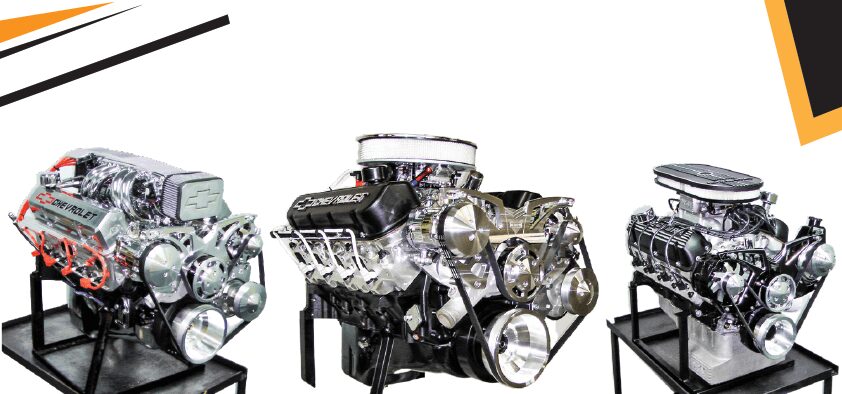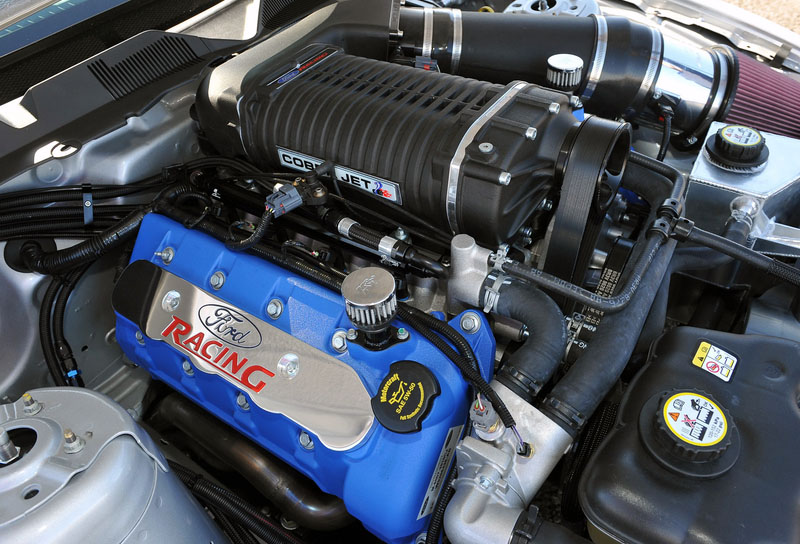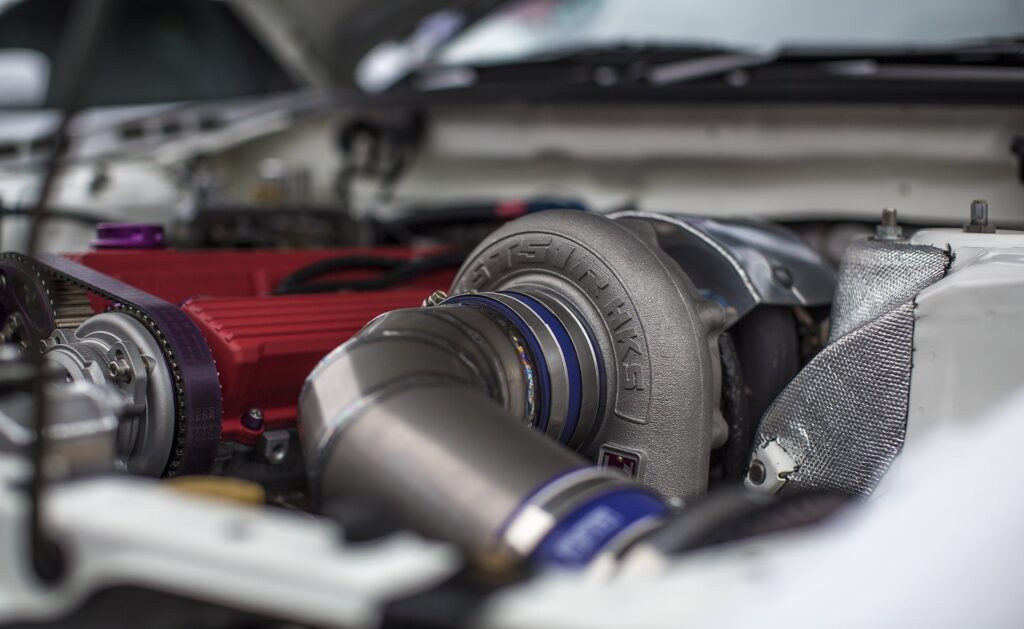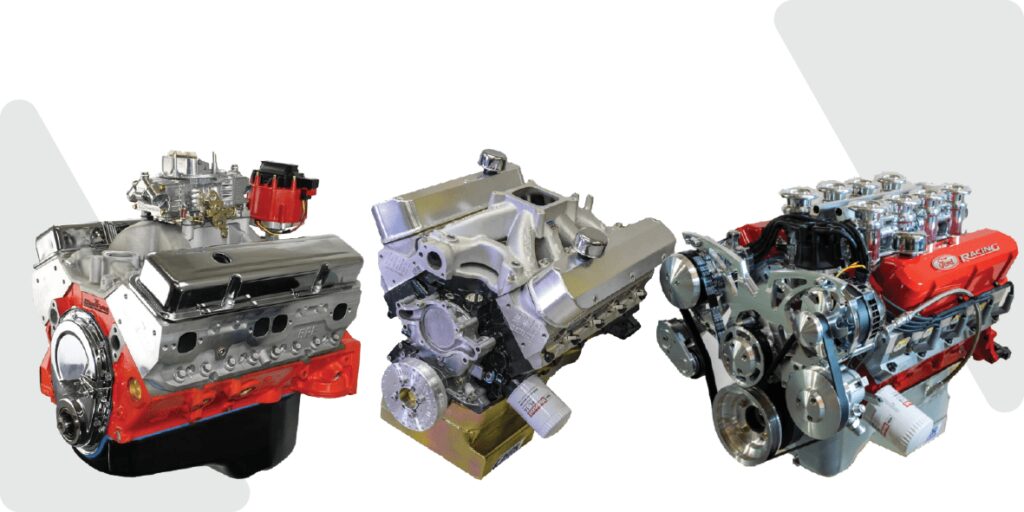6 types of crate engines you need to know

In this deep dive on crate engine types, we’ll embark on a journey of discovery, finding the power, potential, and unlimited possibilities that crate engines provide to the automotive world.
We’ll look at various categories, each with its own set of goals and needs.
The pursuit of additional power, efficiency, and individuality for enthusiasts and performance seekers frequently necessitates an upgrade beyond what the factory engine can deliver. This is where the world of crate engines comes to life, a land with as many possibilities as the wide road.
Every crate engine type has a specific purpose, from stock replacement engines that effortlessly restore a vehicle’s energy to high-performance beasts that redefine acceleration.
Types of crate engines - Stock Replacement
A stock replacement crate engine is intended to be the same as the original engine that arrived with the vehicle when it was new.
These engines are rigorously designed by manufacturers to ensure compatibility with the vehicle’s systems, minimizing the need for modifications or revisions.
The major purpose is to provide car owners with a plug-and-play solution that allows them to replace their existing engine fast and easily while maintaining the vehicle’s original specs.
Benefits of Stock Replacement Crate Engines
- Seamless Integration: The compatibility of stock replacement crate engines is one of their most significant advantages. These engines are designed to fit easily into the engine bay of the car, using the same mounts, connections, and systems. This results in a more seamless installation and less downtime.
- Reliability: Stock replacement crate engines must meet the same quality criteria as factory-installed counterparts, according to manufacturers. The commitment to quality translates into increased dependability and lifespan, providing vehicle owners with peace of mind.
- Preservation of Original Performance: The goal of stock replacement crate engines is to reproduce the performance characteristics of the original engine. This implies that car owners will be able to preserve the driving experience they’ve grown accustomed to while not travelling into unfamiliar area in terms of power delivery or handling.
- Time and Labor Efficiency: Replacing an engine can be a time-consuming task that requires precise technical expertise and close attention to detail. Stock replacement crate engines relieve a lot of this stress because they come pre-assembled and ready to install. This has the potential to dramatically cut labor expenses as well as the overall time necessary for the replacement procedure.
Stock replacement crate engines essentially represent the combination of reliability and simplicity.
Let’s think about a practical example so that you may fully understand the significance of stock replacement crate engines. Imagine a beloved antique 1969 Ford Mustang that has had issues with the engine over the years.
A standard replacement crate engine made particularly for the 302 V8 engine arrangement of the original vehicle would be the ideal answer.
From the intake manifold to the exhaust headers, this engine would have every component required, making an engine change simple.
The outcome? With its recognizable strength and allure, the beloved Mustang roars back to life.
Stock replacement crate engines essentially represent the combination of reliability and simplicity. They serve those who treasure the character of their cars but yearn for a renewed spirit.
These engines maintain the character of the vehicle, enabling fans to continue their automobile journeys without giving anything up. Stock replacement crate engines show that occasionally the classics endure for a reason, whether it’s a daily driver or a historic jewel.
Types of crate engines - Performance Upgrade
The best tools for satisfying the desire for greater horsepower and torque are performance upgrade crate engines.
Performance upgrade crate engines are created specifically to increase a vehicle’s power and performance above and above what the manufacturer intended.
These engines are an example of state-of-the-art engineering, where each component is precisely adjusted to achieve maximum performance while preserving reliability.
Features and Benefits
- Increased power and torque: Performance upgrade crate engines frequently include cutting-edge technologies like high-flow intake and exhaust systems, improved camshafts, and precisely built cylinder heads. These parts work together to increase horsepower and torque, providing lightning-quick acceleration and exhilarating top speeds.
- Better throttle response: Modernized parts and exact tuning result in better throttle response. This implies that the engine responds to the accelerator more quickly and provides quick bursts of power for an exciting driving experience.
- Aggressive sound: Performance upgrade crate engines frequently have exhaust systems built to emit distinctive and combative exhaust noise. An improved engine’s rumble and roar offer an audio dimension and heighten the joy of driving.
- Tailored performance: Performance crate engines come in a range of designs and power outputs. Whether they want to rule the drag strip, rule the racetrack, or simply enjoy passionate drives on twisting roads, enthusiasts can select engines that correspond to their unique performance ambitions.
These engines can push the Supra's turbocharged inline-six to incredible power levels, boosting acceleration and peak speed to hypercar heights.
Let’s put everything into context. Consider a classic muscle car enthusiast who intends to breathe new life into a 1970 Chevrolet Camaro SS.
This enthusiast achieves 405 horsepower and 406 lb-ft of torque by switching in a performance upgrade crate engine like the Chevrolet Performance ZZ6.
This is a huge gain over the original engine’s performance, resulting in a muscle car with the power to outperform modern sports cars while retaining its historical beauty.
The Toyota Supra GR, a modern performance classic, is another fascinating example. Performance upgrade crate engines from renowned tuners are available for enthusiasts looking for even more power.
These engines can push the Supra’s turbocharged inline-six to incredible power levels, boosting acceleration and peak speed to hypercar heights.
Performance improvement crate engines, in essence, represent the pursuit of excellence in the automobile world. They provide a link between the ordinary and the extraordinary, allowing fans to push the limits of their vehicles while maintaining design and engineering integrity.
From muscle cars to supercars, these engines push the boundaries of what’s possible on the road or track, demonstrating that pure enjoyment has no limitations.
Types of crate engines - Off-Road and Racing
Off-road and racing crate engines are purpose-built powerhouses for enthusiasts who enjoy pushing the limits of their cars. Both scenarios necessitate the development of engines capable of withstanding harsh conditions while offering raging performance.
These engines are built to succeed under great duress and give remarkable performance, whether navigating difficult routes or competing in high-stakes races. These engines are designed to dominate their respective realms, which range from desert dunes to asphalt circuits.
Characteristics and Advantages
- Robust construction: Vehicles are subjected to extreme vibrations, shocks, and impacts in off-road and racing settings. These engines are constructed with strengthened components to endure the rigors of off-road terrain and high-speed racing, resulting in lifespan and dependability.
- High-Performance Tuning: Power delivery and responsiveness are critical in racing and off-road settings. These engines are expertly designed to generate maximum horsepower and torque while providing rapid throttle response, allowing drivers to harness the power at the precise moment it is required.
- Improved cooling: Due to the intense demands of off-road and racing settings, effective cooling solutions are required. To minimize overheating during intense workouts, these engines frequently integrate advanced cooling technology such as high-capacity radiators and performance-oriented cooling fans.
- Customization Options: Off-road and racing crate engine enthusiasts can select from a variety of off-road and racing crate engines tailored to their unique needs. There’s an engine for every situation, whether it’s rock crawling, desert racing, or circuit racing.
- Off-road and racing crate engines are outfitted with heavy-duty components such as forged pistons, strengthened connecting rods, and performance camshafts. These components ensure long-term durability and performance under extreme situations
To tackle the difficult terrain and steep inclines of the iconic Rubicon Trail, for example, you’ll need more than a standard engine.
You find the ideal solution in an off-road crate engine, such as the Jeep Performance 6.4L HEMI V8. The torque output and off-road-focused tune of this engine make it an ideal companion for tackling difficult trails, offering the necessary power to overcome obstacles and handle uneven terrain.
Types of crate engines - LS - based
Few engine families have made as deep an imprint on the world of car enthusiasts as the LS series. LS and LS-based crate engines have sparked a revolution, and have come to be associated with performance, adaptability, and power.
These engines have developed a cult following for their ability to transform vehicles into true powerhouses, from historic muscle cars to modern sports machines.
General Motors’ LS engine series, launched in the late 1990s, changed what was achievable in terms of performance and versatility.
These rigs rose to prominence due to their lightweight construction, efficient design, and impressive power potential.
The LS platform has expanded and varied throughout time, now offering a variety of engines appropriate for a wide range of applications.
Features and Advantages
- Lightweight and compact: LS engines are substantially lighter than their predecessors due to their aluminum block and cylinder heads. This lightweight design improves vehicle balance and handling.
- Flexibility: LS-based crate engines come in a variety of displacements and configurations. Engines can be selected to meet the desired power output of the enthusiast, whether it’s a light street configuration or a track-focused monster.
- Power potential: Because of the LS platform’s powerful internals and cylinder head design, it is an excellent candidate for aftermarket modifications. With the correct modifications, LS engines may produce incredible horsepower and torque ratings that rival even exotic engines.
- Reliability: The design of LS engines prioritizes endurance and longevity. These engines are built for high-performance applications, from the structural integrity of the block through the engine’s oiling system.
- Versatility: LS engines are adaptable and can be installed in a variety of vehicles. LS engines may be modified to fit in a variety of vehicles, including historic muscle cars, trucks, and modern sports cars, due to a profusion of aftermarket swap kits.
The Camaro achieves 430 horsepower and 425 lb-ft of torque by bringing in an LS3 crate engine.

What are the possibilities for a classic 1967 Chevrolet Camaro that has been transformed with Ls engines?
The Camaro achieves 430 horsepower and 425 lb-ft of torque by bringing in an LS3 crate engine. This modern powertrain breathes fresh life into the historic muscle vehicle, blending the timeless design of the Camaro with modern power and dependability.
Consider the Mazda MX-5 Miata, a popular lightweight sports car from today. Enthusiasts wishing to improve its performance frequently turn to LS-based crate engines for a significant power boost.
The power-to-weight ratio of the Miata is greatly increased by swapping in an LS engine, resulting in blistering acceleration and dynamic driving characteristics.
LS and LS-based crate engines, in essence, represent a blend of tradition and innovation. They pay respect to the traditional V8 while pushing the envelope in terms of performance and versatility.
Whether it’s a project vehicle, a weekend track machine, or a daily driver, LS engines provide access to unrivaled power and excitement while continuing on the tradition of a legendary engine family.
Types of crate engines - Custom
Custom crate engines appeal to these picky enthusiasts, providing a blank canvas for engineering ingenuity to be exhibited.
These engines are masterpieces precisely built to individual specifications, not merely powerplants.
Custom crate engines represent the idea that no two enthusiasts are the same. These engines are designed to meet specific performance objectives, driving preferences, and even aesthetic preferences.
The underlying principle is simple yet profound: enthusiasts have complete control over the composition of their engine, resulting in a genuinely unique powerhouse.
Characteristics and Advantages
- Tailored performance: Custom crate engines are built to achieve specific performance goals. Enthusiasts can choose desired horsepower and torque statistics, resulting in an engine that offers exactly the type of power they prefer.
- Component selection: Every component, from camshafts to cylinder heads, is chosen with care. Enthusiasts can choose components that match their performance objectives, whether it’s increasing top-end horsepower, improving low-end torque, or achieving a balanced combination.
- Distinctive aesthetics: Beyond performance, custom crate engines serve as a canvas for aesthetic expression. Custom finishes, colors, and even etched accents are available, transforming the engine compartment into a visual show.
- Specific applications: Whether it’s a dedicated drag vehicle, an off-road monster, or a show-stopping cruiser, custom crate engines may be developed to ensure that every ounce of power is expertly harnessed.
- Personal satisfaction: Perhaps the most significant benefit of a custom crate engine is the sense of accomplishment it provides. Enthusiasts get to see their idea come to life while enjoying the excitement of driving a machine that is unique to them.
Custom crate engines provide endless opportunities for boundless creativity.
A custom crate engine designed with the goal of producing high-revving power and lightning-fast throttle response produces a work of beauty.
These engines include a carefully designed camshaft, lightweight components, and a tuned intake system, offering an experience tailored to the twists and turns of the racetrack.
Consider a classic pickup truck fan who wants to combine nostalgia with current power. They breathe new life into their vintage truck while enjoying the benefits of modern reliability and performance by creating a custom crate engine that combines old-school aesthetics with cutting-edge technology.
Types of crate engines - Diesel
Diesel crate engines provide a unique combination of torque-rich performance and durable dependability, making them ideal for trucks, commercial vehicles, and enthusiasts who enjoy heavy-duty activities.
Diesel engines are noted for their unusual qualities, particularly their ability to generate significant low-end torque.
This torque is appropriate for operations requiring the movement of heavy goods, pulling trailers, or navigating difficult terrain. Diesel crate engines are designed to harness tremendous torque while remaining durable and long-lasting.
Characteristics and Advantages
- High torque output: Diesel engines are known for their high torque output. Because this power is available at low engine speeds, they are useful for heavy hauling and towing applications.
- Fuel efficiency: Due to the higher energy density of diesel fuel and the diesel combustion process, diesel engines are intrinsically more fuel efficient than gasoline engines.
- Longevity and durability: Diesel engines are developed with strong components to withstand high compression ratios and high combustion pressures. This design produces engines that are long-lasting and can tolerate intensive use.
- Hauling capacity: Due to their torque-rich nature, diesel engines are excellent candidates for hauling heavy trailers or carrying heavy weights. This capability is critical for commercial vehicles as well as enthusiasts who require significant hauling power.
- Range and resilience: Diesel engines are more fuel efficient than gasoline engines, allowing for longer driving ranges. Furthermore, because of their torque and ability to tackle rugged terrain, they are well-suited for off-roading and rural areas.
With their torque-rich performance and rugged endurance, diesel crate engines continue to carve a niche as the backbone of heavy-duty mobility.
The engine’s robust construction and torque delivery provide confidence in traversing demanding off-road environments.
In essence, diesel crate engines represent the embodiment of power and reliability in the automotive world.
They are the workhorses that effortlessly handle heavy loads and demanding tasks, making them indispensable for commercial applications and enthusiasts seeking ultimate towing capability.
Crate engines represent a dynamic solution for those seeking to redefine their automotive experience. These pre-assembled powerplants hold the potential to transform a vehicle’s performance, breathing new life into daily drivers, reviving classic cars, and propelling racers to victory.
Also related articles ..

Are Turbo Engines Reliable
Are Turbo Engines Reliable? – Find out everything about Turbocharged engines.


